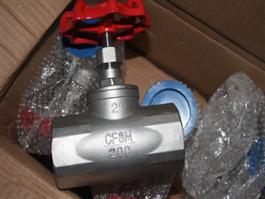Description
Globe valves, also known as stop valves or control valves, are a type of valves used for regulating flow in a pipeline, consisting of a movable disk-type element and a stationary ring seat in a generally spherical body. They are widely used in such applications requiring throttling and frequent operation.
Application
Globe valves are employed as regulation and cut-off device in such pipelines as tap water, sewage, construction, petroleum, chemical products, foodstuff, medicine, textile, electricity, ship, metallurgy, energy system, etc.
Advantages
1. Compared with similar brands, our stop valves have advantages of good sealing performance, small friction between sealing faces and long service life.
2. Control valves need small torque to open.
3. Valve body is precisely cast.
4. Valve disc is processed by CNC technology.
Features
1. Compared with gate valves, globe valves are much simpler in structure. Thus they are easy to manufacture and maintain.
2. When starting or stopping stop valves, the disc stroke is short. Therefore, its height is a bit lower than that of gate valves, but the structure length is longer.
3. Medium passway of control valves is quite zigzag, so the hydraulic resistance is large, leading to big power consumption.
4. When in use, the flow direction of medium in globe valves is unidirectional and its flow direction can not be changed.
Attention
1. Stop valves should be chosen when applied in such pipelines under the condition of high temperature and pressure as coal-fired power plant, nuclear power plant, etc.
2. Before installation, remove all foreign matter in the pipeline by flushing the line with water or compressed air. End connections should be carefully checked and cleaned.
3. Globe valves work best when standing upright, with stem pointing straight up.
4. Installing control valve with its stem down is not recommended.
5. The arrow marking on the body indicates the flow direction.
Operation
1. Before putting new valve into service, check the size, ends, material and pressure temperature limitation of the valve with the operating parameters for capacity and compatibility.
2. Globe valves are closed by turning in the clockwise direction and opened by turning in the anti-clockwise direction.
3. Stop valves are normally used for regulation. The proper functioning of the installed valve should be checked by opening and closing several times.
4. Ensure that pressure surges (water hammer) do not exceed the nominal operating pressure.
Maintenance
1. Parts of globe valves are generally for free maintenance. The materials of the sliding parts have been selected to keep tear and wear to a minimum.
2. For reasons of safety and to reduce maintenance and repair costs, all valves, especially those which are operated occasionally should be inspected at least 4 times a year.
3. Lubricating the moving parts such as stem and stuffing box screws with oil or grease and repacking or replacing the gland packing and cover gaskets in proper time will ensure long service life of the stop valves.
Dismantling
1. If globe valves do not seal tight, indicating the body, disc or wedge seat is damaged, the valves must be dismantled.
2. Before removing the complete valve from the pipeline or prior to repair of the valve in the pipeline itself, entire stop valves must be depressurized and sufficiently cooled down so that the temperature is below the evaporation temperature of the flow medium.
3. The seating surfaces of control valves should then be examined to be ground and lapped. The grinding and lapping to be done by qualified personnel, using suitable equipment.


